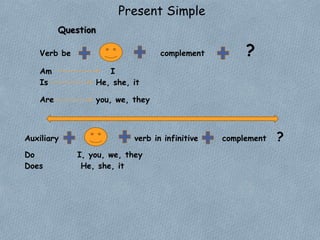
Verb Tenses Guide
- 1. Present Simple Question Verb be complement ? Am I Is He, she, it Are you, we, they Auxiliary verb in infinitive complement ? Do I, you, we, they Does He, she, it
- 2. Past Simple Question Auxiliary verb in infinitive complement ? Did I, you, he, she, it, we, they Affirmative Verb in past complement Negative auxiliar in verb in complement negative in infinitve didn´t
- 3. Past Continuous Auxiliary complement ? Were you, we, they Was I, He, she, it Affirmative you, we, they Negative were complement He, she, it was complement you, we, they weren’t complement He, she, it wasn’t complement
- 4. Present Continuous Question Auxiliary verb complement ? Verb be with -ing Am I Is he, she, it Are we, you, they Affirmative I am verb complement He, she, it is with -ing We, you, they are Negative I am not verb complement He, she, it isn’t with -ing We, you, they aren’t
- 5. Past continuous Question Auxiliary verb complement ? Verb be with -ing IN PAST Was I, he, she, it Were we, you, they Affirmative I, he, she, it was verb complement We, you, they were with -ing Negative I, he, she, it wasn’t verb complement We, you, they weren’t with -ing
- 6. Present Perfect Simple Question Auxiliary ever verb in past complement ? HAVE participle Have I you, we, they Has he, she, it Affirmative I, you, we, they have (‘ve) verb in past complement He, she, it has (‘s) participle I’ve eaten You’ve drunk We’ve talked They’ve listened She’s played He’s been It’s eaten
- 7. Present Perfect Simple Negative I, you, we, they haven’t verb in past complement He, she, it hasn’t participle
- 8. Present Perfect Simple FOR Goes with periods of time, like three hours, ten minutes, a long time. It goes just before the time period. SINCE Goes with points in time, like 1990, Christmas, last week. It goes just before the time period. EVER Means “sometime before now”. It is used in questions, e.g. Have you ever / Haven’t you ever…?, and in negative satatements, e.g. Nobody has ever travelled there before. It goes between have and the past participle
- 9. Present Perfect Simple NEVER Means “at no time before” and it is used in negative statements, e.g. I’ve never been to New York before. It goes between have and the past participle. JUST Means “not so long ago”. It comes between have and the past participle, e.g. They have just gone out. ALREADY Shows an action has been completed. It comes between have and the past participle: I have already heard that song.
- 10. Present Perfect Simple YET Means “up to a specified time” and is used only in the negative and question forms of the present perfect tense. It is normally placed at the end of a sentence, e.g. I haven’t been to the supermarket yet.
- 11. Present Perfect Continuous Question Auxiliary BEEN verb in complement ? HAVE -ing Have you, we, they Has he, she, it Affirmative I, you, we, they have (‘ve) BEEN verb in complement He, she, it has (‘s) -ing I’ve been eating You’ve been drinking We’ve been talking They’ve been listening She’s been playing He’s been speaking It’s been eating
- 12. I went to the theatre last night. I had bought tickets months ago because I had read some very good reviews. I had arranged to meet my friend in the café in front of the theatre before the show but she didn’t arrive. By the time I left the ccafé, I had already drunk five coffees and had been waiting for over an hour. When I walked out the café, I saw my friend standing on the other side of the Street. She had already picked up the tickets and was angry because she had been waiting for a long time. She hadn’t got my message about meeting in the café
- 13. Past Perfect Simple Question Auxiliary verb in past complement ? HAD participle I you, we, they he, she, it Affirmative I, you, we, they had (‘d) verb in past complement He, she, it participle I’d eaten You’d drunk We’d talked They’d listened She had played He’d been It had eaten
- 14. Past Perfect Simple Negative I, you, we, they hadn’t verb in past complement He, she, it participle
- 15. Past Perfect Continuous Question Auxiliary BEEN verb in complement ? HAD -ing you, we, they he, she, it Affirmative I, you, we, they had (‘d) BEEN verb in complement He, she, it -ing I’d been eating You had been drinking We had been talking They’d been listening She’d been playing He had been speaking It’d been eating
- 16. Past Perfect Continuous Negative I, you, we, they hadn’t been verb in complement He, she, it -ing
- 17. Past Perfect continuous Negative I, you, we, they haven’t been verb in complement He, she, it hasn’t -ing I hadn’t been eating You hadn’t been drinking We hadn’t been talking They hadn’t been playing She hadn’t been playing He hadn’t been studying It hadn’t been running